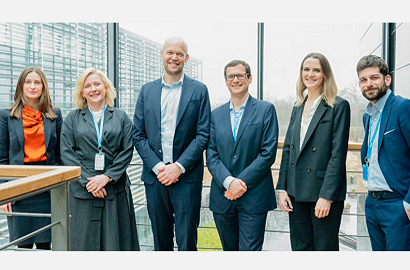Ørsted teams up with Acciona to make floating offshore wind energy production cheaper

The companies aim to industrialise platform construction and explore new sustainable materials
Energy firm Ørsted has signed a memorandum of understanding with Acciona, agreeing to jointly develop new solutions in the field of floating offshore wind energy. More specifically, they will be working on industrialising the manufacturing process for floating platforms in order to make the technology cheaper and more competitive.
This type of construction solution has to respond to the specific needs of the different offshore wind turbines currently being developed on the market, as well as having to adapt to different depth levels. Hence the importance of creating and implementing a competitive and large-scale manufacturing model that can also be easily adapted to suit each customer's requirements.
Carbon neutral materials
The Danish renewable energy company's agreement with Acciona's infrastructure division has a second objective: to jointly explore the use of bio-cement, bio-concrete and other carbon-neutral materials and solutions that support both companies' biodiversity and carbon reduction goals.
The alliance combines Ørsted's experience of over thirty years in offshore wind energy with Acciona's experience in constructing large-scale offshore projects. The Spanish company does in fact have specialist machinery and equipment, including three floating docks. One of these, the Kugira, is the largest in Europe.
European target
The joint venture will strengthen the European supply chain to meet future demand for floating wind energy projects. The European Union wants to achieve 60 gigawatts of installed offshore wind power by 2030, adding floating facilities and others anchored to the seabed, an approach that is already established in northern Europe. The EU's target for 2050 is much more ambitious, as the aim is to achieve 300 gigawatts of installed offshore wind power.
Ørsted's Executive Vice President and CEO for Europe, Rasmus Errboe, describes his company's strategic goal as “advancing the development of technology for this sector and bringing it to the market”, and he is convinced that this agreement will help them to achieve this, and also to pursue another goal: “To take floating wind energy from its current innovation phase to a new stage of industrialisation”. In addition, he says, “At Ørsted we intend to further grow our European floating portfolio, and Spain is a key market of interest to us”.
Innovating and making technology cheaper
Gabriel Davies, Programme Director for Floating Wind at the Danish multinational explains, “Working with Acciona will help us take the next step to realise the potential of floating wind at scale here in Europe - to innovate, invest in the supply chain, and bring costs down, all while reducing carbon emissions. Ørsted has done just that with seabed-fixed offshore wind, and we're going to do it all over again with floating wind.”
Huberto Moreno, for his part, CEO of Acciona’s Construction Division,, values the combined experience of both companies as “key to the success of this agreement”, and says, “This alliance will help us to accelerate the development of our business as a supplier of offshore platforms for the wind energy industry”.
Photo: Ørsted-Acciona




